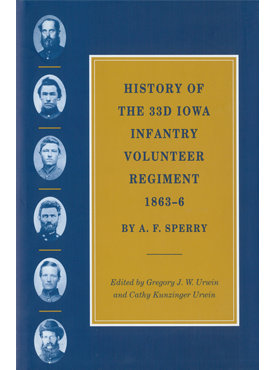Written and first published in 1866 soon after the author’s discharge from the Union army, A. F. Sperry’s History of the 33d Iowa Infantry is one of the classic regimental histories of the American Civil War. It is a fresh, honest, and detailed account of the regiment’s movements and actions—in Kentucky, Mississippi, Alabama, Texas, and, most notably, Arkansas, where it played a conspicuous role in the Helena, Little Rock, and Camden campaigns.
As the regiment’s fife and drum major responsible for sounding the duty calls that regulated a soldier’s day, Sperry was well situated to observe the inner workings of his unit. His perceptive narrative of army life on the march and in camp captures the courage, humor, and sufferings of the rank and file. Although he took pride in his regiment’s accomplishments, he unflinchingly reveals the hard side of war with vivid depictions of looting, resistance to orders, and “extermination” of Confederate guerrillas.
By itself, Sperry’s memoir is remarkable and important. It is made even more valuable by the new introduction and detailed notes from the editors. Their meticulous annotations include quotes from the diaries, letters, and reminiscences of other soldiers, adding depth and detail to the account. Seven maps and thirty-seven never-before-published photographs of 33d Iowa personnel taken during the war further enrich the book. Civil War historians and reenactors everywhere will welcome this important new classic.
Gregory J. W. Urwin is a prize-winning military scholar who has published seven books including Facing Fearful Odds: The Siege of Wake Island. He is a field officer in the Frontier Brigade, the largest Union reenactment unit west of the Mississippi River.
Cathy Kunzinger Urwin has published Agenda for Reform: Winthrop Rockefeller as Governor of Arkansas, 1967–1971.
“The Civil War in the West has a single goal: to promote historical writing about the war in the western states and territories. It focuses most particularly on the Trans-Mississippi theater, which consisted of Missouri, Arkansas, Texas, most of Louisiana (west of the Mississippi River), Indian Territory (modern day Oklahoma), and Arizona Territory (two-fifths of modern day Arizona and New Mexico) but encompasses adjacent states, such as Kansas, Tennessee, and Mississippi, that directly influenced the Trans-Mississippi war. It is a wide swath, to be sure, but one too often ignored by historians and, consequently, too little understood and appreciated.
Topically, the series embraces all aspects of the wartime story. Military history in its many guises, from the strategies of generals to the daily lives of common soldiers, forms an important part of that story, but so, too, do the numerous and complex political, economic, social, and diplomatic dimensions of the war. The series also provides a variety of perspectives on these topics. Most importantly, it offers the best in modern scholarship, with thoughtful, challenging monographs.
Secondly, it presents new editions of important books that have gone out of print. And thirdly, it premieres expertly edited correspondence, diaries, reminiscences, and other writings by participants in the war.
It is a formidable challenge, but by focusing on some of the least familiar dimensions of the conflict, The Civil War in the West significantly broadens our understanding of the nation’s most pivotal and dramatic story.”
—Daniel Sutherland, from the preface of I Do Wish This Cruel War Was Over

